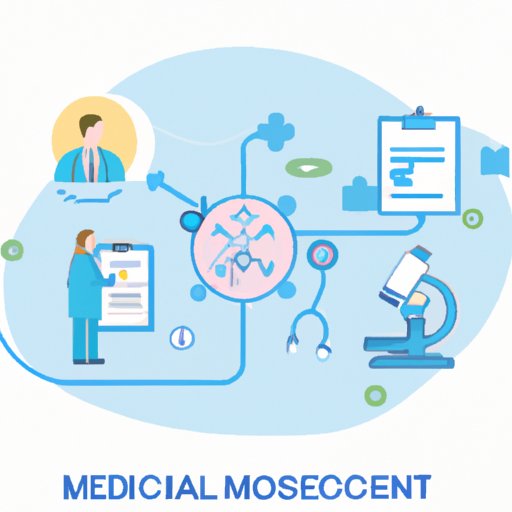Introduction
Medical decision making is an essential component of the healthcare system, involving the evaluation and selection of treatments or interventions for patients. The goal is to provide the most appropriate care based on available evidence, while minimizing risks and improving patient outcomes. This article examines the process of medical decision making, exploring the benefits of evidence-based approaches, the role of healthcare professionals, and the potential impact on patient outcomes.

Exploring the Process of Medical Decision Making
Medical decision making is defined as the process of selecting among alternative courses of action in order to achieve desired health outcomes. The process involves a variety of components, including diagnosis and treatment planning, evaluation of alternatives, and implementation of the chosen intervention. Other considerations include patient preferences and values, as well as legal and ethical considerations.
Examining the Benefits of Evidence-Based Medical Decision Making
Evidence-based medicine (EBM) is a systematic approach to medical decision making that relies on the best available evidence to make decisions about diagnosis and treatment. Evidence-based decisions are based on a thorough review of existing research, including randomized controlled trials, observational studies, and expert opinion. The main advantage of EBM is that it can reduce the risk of errors and improve patient outcomes by utilizing the most current and reliable evidence.

Understanding the Role of Medical Professionals in Medical Decision Making
Physicians play a key role in the medical decision making process, leading the discussion and providing insight into the best course of action. Nurses and other healthcare professionals also have an important role to play, providing support and guidance throughout the process. All healthcare providers must remain up-to-date on the latest evidence and practice guidelines to ensure the best possible outcomes for their patients.

Analyzing Different Types of Medical Decision Making
Medical decision making can be divided into two broad categories: traditional and modern. Traditional approaches rely on experience and intuition, while modern approaches depend on evidence-based practices and data-driven analysis. Clinical decisions are typically based on individual patient characteristics, while cost-benefit analysis takes into account the cost of treatments, procedures, and medications.
Comparing Traditional and Modern Approaches to Medical Decision Making
Both traditional and modern approaches to medical decision making have advantages and disadvantages. Traditional methods are often faster and easier, but can lead to errors due to lack of evidence. Modern methods are more accurate and efficient, but require more time and resources. As technology advances and healthcare becomes increasingly complex, modern approaches are becoming increasingly necessary.
Investigating the Impact of Medical Decisions on Patient Outcomes
The quality of medical decisions can have a significant impact on patient outcomes. Factors such as adherence to evidence-based practices, communication between healthcare professionals, and patient engagement can all contribute to positive results. However, poor decisions can lead to negative outcomes, including increased costs, delays in care, and decreased patient satisfaction.
Discussing the Challenges of Medical Decision Making in a Changing Healthcare Environment
As the healthcare system evolves, so too do the challenges of medical decision making. Technological advancements, increasing complexity, and new regulations all present unique challenges. Healthcare professionals must remain up-to-date on the latest research and regulations to ensure the best possible outcomes for their patients.
Conclusion
Medical decision making is an essential part of the healthcare system, involving the evaluation and selection of treatments or interventions for patients. This article explored the process of medical decision making, examining the benefits of evidence-based approaches, the role of healthcare professionals, and the potential impact on patient outcomes. It compared traditional and modern methods, discussing the challenges of adapting to a changing healthcare environment. Ultimately, the quality of medical decisions can have a significant impact on patient outcomes, and healthcare professionals must remain up-to-date on the latest evidence and regulations to ensure the best possible outcomes for their patients.
(Note: Is this article not meeting your expectations? Do you have knowledge or insights to share? Unlock new opportunities and expand your reach by joining our authors team. Click Registration to join us and share your expertise with our readers.)
